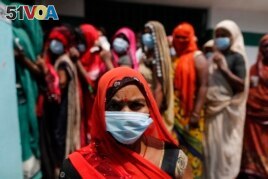A new wave of COVID-19 infections, combined with limited hospital beds and vaccines, is threatening countries across Asia.
Both India and Thailand reported record daily coronavirus cases Thursday.
India locked down its two largest cities, New Delhi and Mumbai, as the country passed 200,000 daily infections for the first time. Hospitals reported few remaining beds and limited oxygen supplies.
Avinash Gawande is an official at the Government Medical College and Hospital in Nagpur. “The situation is horrible,” he said. “We are a 900-bed hospital, but there are about 60 patients waiting and we don’t have space for them.”
In the past eight days, India has set seven new records for daily cases of infection. There are 14.1 million total cases in India, an amount second only to the United States.

People wait to cast their votes during local panchayat elections on the outskirts of Prayagraj, in the northern Indian state of Uttar Pradesh, Thursday, April 15, 2021. India reported more than 200,000 new coronavirus cases Thursday.
Rising infections are also threatening the medical care system in the Philippines and Thailand.
In the Philippine capital of Manila, COVID-19 infections reached 266,489, representing about 30 percent of the cases in the country.
Families of COVID-19 patients noted the difficulty of finding hospital beds. And some travelled longer distances outside the city for healthcare needs.
Thailand reported 1,543 new coronavirus cases on Thursday. It is the biggest rise since the start of the pandemic and the fourth record increase this week.
As Thailand was considering new restriction measures, its neighbor Cambodia ordered a lockdown of the capital, Phnom Penh, and the surrounding area. In only two months, cases have increased by almost 10 times in the Southeast Asian country.
Bangladesh also began a lockdown for one week starting Wednesday. The infection rate there has reached around 7,000 cases a day in the last two weeks. There were only 300 a day in February.
Vaccine shortages
Europe, meanwhile, passed one million COVID-19 deaths Wednesday. About 1.6 million cases appear each week.
Dr. Hans Kluge is an official with the World Health Organization. He said there are signs the virus is slowing in Europe, especially among people over 80 years old. But he said countries must keep social distancing measures and speed up vaccinations.
Infections and deaths in Britain have greatly decreased since January. The country went under a long national lockdown and has a successful vaccination program.
But there is a large gap between rich and poor countries when it comes to vaccine access.
Thailand, for example, has vaccinated only 0.4 percent of its population. It is far behind its wealthy neighbor of Singapore which has vaccinated 14.6 percent.
Some countries, including Australia, have to delay their vaccination goals after serious side effects led to restrictions on AstraZeneca and Johnson & Johnson vaccines.
In Japan, the lack of vaccines and rising infections are now threatening the Tokyo Olympics. The games, first set for last year, were delayed because of the pandemic.
Johns Hopkins University researchers have now reported more than 138 million cases of coronavirus, including nearly 3 million deaths, around the world.
I’m Caty Weaver.
Reuters and The Associated Press reported this story. Dan Novak adapted it for VOA Learning English. Hai Do was the editor.
_______________________________________________________
Words in This Story
lockdown– n. an emergency measure of keeping people in a secure place to avoid or prevent danger
access– n. – a way of being able to use or get something